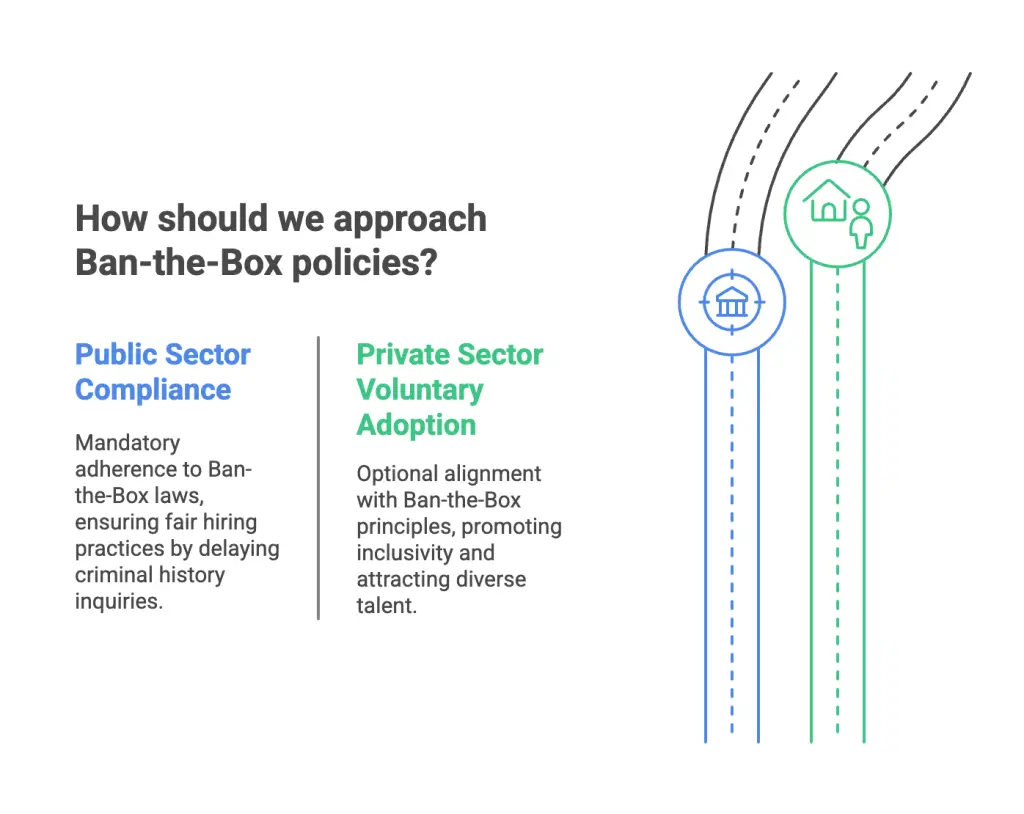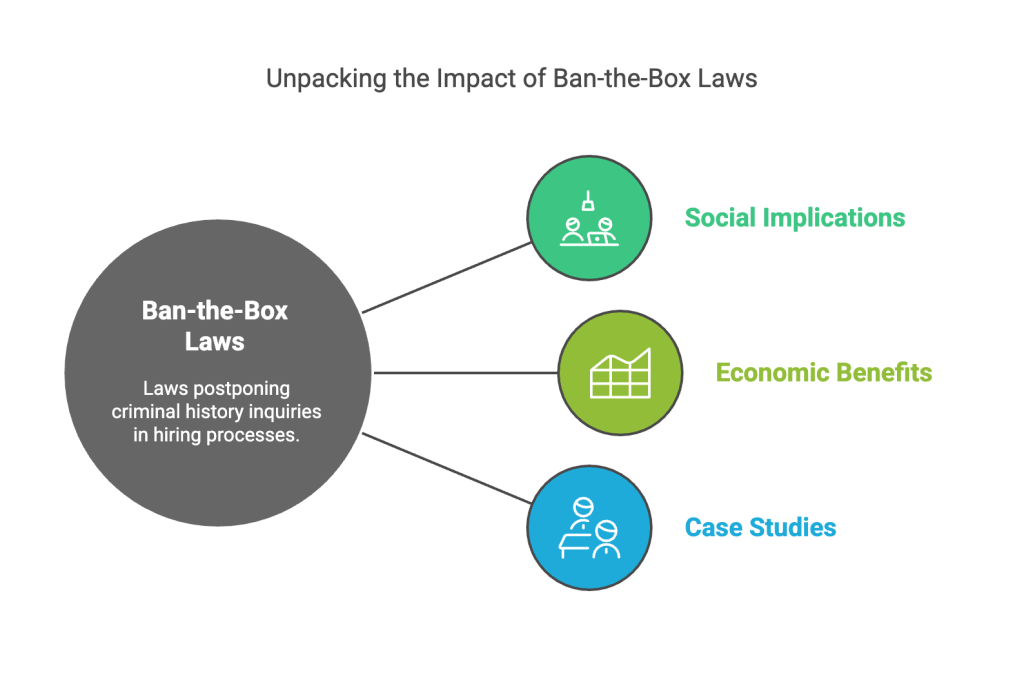Navigating the intricate landscape of background checks in Michigan requires an understanding of "Ban-the-Box" laws, particularly distinctions between public and private sectors. These laws intend to promote "fair chance hiring" in Michigan by delaying the point at which employers inquire about criminal histories, ensuring candidates are evaluated based on their qualifications first.
In this comprehensive guide, we delve into the nuances of Michigan Ban-the-Box compliance, the legal and social implications, and the technological advancements shaping the process. Along the way, we will provide data-driven insights and actionable advice for both employers and job seekers.
Key Takeaways
- Ban-the-Box laws in Michigan aim to delay criminal history inquiries during hiring to increase job opportunities for individuals with criminal records.
- Public sector employers in Michigan must follow stricter Ban-the-Box laws, while private sector employers have more flexibility but often voluntarily adopt similar practices.
- These laws help level the job application process, allowing candidates to showcase their skills and experiences before revealing any criminal past.
- Digital tools help enforce Ban-the-Box compliance by delaying criminal history checks and protecting sensitive information.
- Employers and job seekers should stay informed about Ban-the-Box laws to ensure fair hiring practices and maximize employment opportunities.
Introduction
The Ban-the-Box movement started as a grassroots effort to give individuals with criminal records a fair shot at employment. Its goal is to remove the checkbox on job applications that asks about criminal history, delaying such disclosures until later in the hiring process. This change allows employers to evaluate candidates based on their skills and qualifications before considering their criminal background.
Michigan adopted Ban-the-Box laws to promote fair chance hiring. The state has unique rules distinguishing public and private sector practices. In the public sector, Michigan mandates compliance through specific regulations. The private sector, however, has more flexibility but still faces requirements to avoid discriminatory practices. Understanding these differences is crucial for employers and job seekers navigating the job market in Michigan.
Understanding Michigan Ban-the-Box Compliance
Ban-the-Box laws aim to create a fair playing field for job applicants with criminal records. In Michigan, these laws have a few straightforward objectives: to cut down on recidivism and to broaden job opportunities for those with criminal backgrounds. By removing questions about criminal history from initial job applications, employers first consider the applicant’s skills and qualifications.
These laws reshape early stages of hiring. Candidates get a fair chance to make a first impression based on their abilities and experience, rather than their criminal past. The goal is to level the playing field, ensuring that all applicants, regardless of background, are given an equal opportunity to prove their worth.
When comparing public and private sectors, the differences in compliance are notable. Public sector employers in Michigan are legally required to remove criminal history questions from job applications. This ensures candidates are assessed for what they bring to the table, not what’s in their past. On the private side, the situation is somewhat different. While some localities may apply Ban-the-Box rules to private employers, broader state mandates are less common. This leads private companies to voluntarily adopt these practices, driven by an understanding of their benefits.
How does this affect you, as an employer or a job seeker? For employers, it means a shift in the hiring process—one that could lead to a more diverse and inclusive workforce. For job seekers with a criminal record, it translates to a chance to focus on showcasing skills without the immediate shadow of their past.
Visit the EEOC's guidance for more on how to navigate these changes and make informed decisions.
Legal Framework
Public sector employers in Michigan operate under specific legislations designed to uphold Ban-the-Box principles. Public entities are required to delay inquiries into a candidate's criminal history until later stages of the hiring process. This means not asking about criminal records on initial applications and postponing any background checks until an interview offers some promise of employment. This aims to provide all applicants with a fair chance, letting their skills and experience speak first.
For private sector businesses, compliance is more about encouragement than obligation. Michigan does not mandate private employers to follow Ban-the-Box laws as stringently as public entities, yet many choose to align their practices with these principles voluntarily. Private companies often find it beneficial to follow suit, not just for inclusivity but also to attract a wider pool of talent. It's important for these employers to develop clear policies and ensure they're communicated effectively to HR teams and hiring managers.

The Equal Employment Opportunity Commission (EEOC) offers guidance that can help both sectors conduct background checks in harmony with Ban-the-Box aims. EEOC guidelines emphasize using criminal history information only as it pertains to job relevance, which means evaluating any records with context. For example, consider the time elapsed since the offense, the nature of the crime, and its relevance to the job duties. This approach supports fair hiring and reduces the risk of discrimination.
Understanding these legal frameworks helps you ensure compliance and promote fair hiring. Whether you work for a public agency or a private firm, recognizing both the required and suggested practices in Michigan can help you create a more equitable hiring process. This also puts your organization in a better position to handle potential challenges if they arise. Are you confident your policies reflect these principles?
Social Implications
Ban-the-Box laws in Michigan are about more than just who gets an interview. They reflect a shift towards inclusive hiring practices aimed at leveling the playing field. By postponing inquiries into criminal history, these laws give applicants a chance to be seen for their skills and experience first. This critical shift helps reduce stigma and fosters more diverse workplaces, which can lead to innovation and enhanced performance.
Economically, communities that embrace Ban-the-Box see broader employment opportunities. With barriers to entry reduced, more individuals with criminal records can find work, which can lower unemployment rates and reduce repeat offenses. For instance, a study by the National Employment Law Project found that jurisdictions with such laws often experience increased hiring among people with past convictions, translating to stable incomes and improved local economies.

Case studies from places like Detroit highlight how Ban-the-Box laws can transform job markets. Some local businesses report a richer talent pool and notice a positive impact on company morale and productivity. Yet, the differences in implementation between urban and rural areas can lead to varied results. In more rural settings, challenges remain due to a lack of awareness or resources, making it essential for advocacy groups to reach these areas with targeted campaigns and support.
What role might you play in pushing for fair hiring practices at your organization? By considering the broader social implications, you can help break down barriers and contribute to a more equitable job market in Michigan.
Technological Dimensions
Digital background checks have revolutionized how companies adopt Ban-the-Box practices. Automated systems streamline compliance by delaying the request for criminal history until after the initial stages of the hiring process. Platforms like Checkr and HireRight offer customizable workflows to adhere to local laws like Michigan's Ban-the-Box regulations. This technology not only reduces administrative burdens but also minimizes human error.
Keeping a candidate's criminal history confidential is crucial. Systems encrypt sensitive information and ensure it's only accessible after an applicant is deemed qualified. Employers benefit by using technology that provides secure access controls and audit capabilities. These measures build trust and demonstrate a commitment to fair hiring practices.
Are your company's digital tools up to the task? Consider evaluating whether current systems support the principles of Ban-the-Box, ensuring you're fostering a fair and inclusive hiring process.
Actionable Takeaways for Employers
Compliance with Ban-the-Box laws in Michigan requires deliberate steps. Here's how you can ensure your hiring process aligns with these regulations:
- Compliance Checklist: Develop a checklist that outlines each step of your hiring process in relation to Ban-the-Box requirements. Make sure your job applications and interview stages do not seek criminal history until legally permitted. This ensures a compliant approach that evaluates candidates on their qualifications first.
- Training and Awareness: Schedule regular training sessions for your HR team and hiring managers. Equip them with knowledge about Ban-the-Box laws and emphasize the importance of fair chance hiring. This training should include scenarios and role plays to sensitize staff when engaging with applicants who have criminal histories.
- Policy Updates: Review your current hiring policies and update them based on the most recent legal guidelines. Ensure your documents reflect any changes in process timing and candidate evaluation criteria. Regularly reviewing these policies ensures your organization stays compliant and reduces any legal risks associated with missteps.
By adopting these measures, you not only adhere to legal requirements but also promote an inclusive hiring environment. Is your current process structured to address these needs? Consider the impact on your organization and take the necessary steps to improve.
Actionable Steps for Job Seekers
Understanding your rights is the first step. Under Michigan's Ban-the-Box laws, employers can't ask about your criminal history on initial job applications. This means your qualifications and skills should be front and center when applying for a job. Know that you have the right to a fair assessment based on your capabilities, not your past.
When preparing your application, focus on your expertise and achievements. Highlight specific skills, professional accomplishments, and any training you have completed. Craft a strong resume and cover letter that speak to your strengths without volunteering criminal history information prematurely. Remember, many employers value honesty and transparency, but timing is crucial.
Seeking resources can also make a big difference. Organizations such as local workforce development agencies often provide support to job seekers with criminal records. They may offer resume workshops, interview coaching, and even job placement programs. Connecting with these resources can provide guidance and boost your confidence throughout the application process.
Taking these steps not only enhances your job search but also positions you to explain your background when the time is right, ensuring you present yourself as the skilled professional you are.
Conclusion
Understanding the differences in Ban-the-Box compliance between Michigan's public and private sectors involves grasping the distinct obligations and freedoms each must navigate. Public sector employers in Michigan adhere to stricter guidelines, delaying criminal history inquiries until later stages of hiring to foster fairer assessments. By contrast, private sector employers enjoy more flexibility, although many follow similar practices to promote fairness and diversity.
Looking forward, it's worth considering how these laws might evolve. The trend towards wider adoption of Ban-the-Box policies suggests continued progress in integrating former inmates into the workforce. As societal attitudes shift, we may see a push for more uniform standards across sectors, potentially minimizing existing disparities.
For employers and job seekers alike, engaging with the principles of fair chance hiring can lead to more inclusive and enriched workplaces, reinforcing the value of diverse backgrounds and experiences in strengthening both the local economy and community cohesion.
Frequently Asked Questions (FAQs)
Does MI Ban-the-Box apply to private companies?
No, the Ban-the-Box law in Michigan currently applies only to public employers, not private companies.
When can public employers ask about criminal history in MI?
Public employers in Michigan can ask about criminal history after an initial interview or once the applicant is deemed otherwise qualified for the position.
What penalties exist for violating MI Ban-the-Box?
Violations typically result in investigation and enforcement by state agencies, but exact penalties vary and can include fines or other legal actions.
How to update job applications for compliance?
Remove any sections that ask for criminal history prior to an interview. Focus on qualifications and skills instead.
Do Detroit employers follow stricter Ban-the-Box rules?
Yes, Detroit has its own ordinance that applies to both private and public employers, requiring further restrictions on when criminal history can be requested.
Can employers rescind offers based on records in MI?
Yes, employers can rescind job offers based on relevant criminal records discovered after a conditional offer, though they must follow proper protocols.
Are misdemeanors covered under MI Ban-the-Box?
Yes, misdemeanors are included in the Ban-the-Box considerations, meaning inquiries on applications are delayed.
How to handle disclosures after a conditional offer in MI?
When disclosing criminal history after a conditional offer, be truthful and provide context for any offenses. This transparency can aid in the discussion.
Does MI Ban-the-Box cover gig workers?
No, the law does not specifically mention gig workers, so its applicability is limited to traditional public employment.
Are expunged records exempt from MI background checks?
Yes, expunged records are not accessible and should not be considered during background checks in Michigan.
Is it mandatory for employers to notify applicants of a background check?
Yes, employers must notify applicants if they plan to conduct a background check and obtain written consent.
Can an applicant request a copy of their background check in MI?
Yes, applicants have the right to request a copy of their background report if one was used to make an employment decision.
What should you do if your criminal record is incorrect?
You should promptly contact the reporting agency to resolve inaccuracies. Providing correct documentation can aid in correction.
Can a criminal record affect your chances of employment in MI?
Yes, a criminal record can impact employment opportunities, but it must be relevant to the job and considered post-offer.
Definitions
Fair Chance Hiring
Fair chance hiring refers to employment practices that give individuals with criminal records a more equal opportunity to compete for jobs. This approach delays criminal history checks until later in the hiring process, helping employers focus first on an applicant's skills. It encourages evaluating people for their qualifications rather than past mistakes.
Background Check
A background check is a process used by employers to review a candidate’s history, often including criminal records, employment history, and education. Under Ban-the-Box policies, background checks typically occur after a conditional job offer or interview. Doing this later helps reduce bias in early hiring decisions.
Public Sector
The public sector includes organizations run by government entities, such as state departments, city offices, or public schools. In Michigan, these employers are required by law to follow Ban-the-Box rules. This means they cannot ask about criminal records on job applications and must wait until later in the hiring process to conduct background checks.
Private Sector
The private sector includes businesses not operated by government departments, from retail chains to tech companies. In Michigan, private employers are not always required to follow Ban-the-Box laws, but many do so voluntarily. Adopting similar hiring practices can lead to a broader talent pool and reduce the risk of discrimination claims.
Equal Employment Opportunity Commission (EEOC)
The EEOC is a federal agency that enforces laws against job discrimination. It provides guidance on how to use criminal history in hiring without violating civil rights. The agency recommends considering how relevant an offense is to the job, how much time has passed, and whether hiring decisions are being made fairly.
References
- National Employment Law Project (Ban-the-Box Overview): https://www.nelp.org/insights-research/ban-the-box-fair-chance-hiring-state-and-local-guide/
- Study by Michigan Law and Princeton University on unintended racial discrimination due to Ban-the-Box: https://quadrangle.michigan.law.umich.edu/issues/fall-2016/ban-box-legislation-leads-increase-racial-discrimination
- Technological adoption of Ban-the-Box principles (Example from private employers): https://scholarship.law.edu/cgi/viewcontent.cgi?article=3685&context=lawreview

GCheck Editorial Team
Meet the GCheck Editorial Team, your trusted source for insightful and up-to-date information in the world of employment background checks. Committed to delivering the latest trends, best practices, and industry insights, our team is dedicated to keeping you informed.
With a passion for ensuring accuracy, compliance, and efficiency in background screening, we are your go-to experts in the field. Stay tuned for our comprehensive articles, guides, and analysis, designed to empower businesses and individuals with the knowledge they need to make informed decisions.
At GCheck, we're here to guide you through the complexities of background checks, every step of the way.





